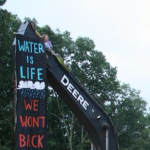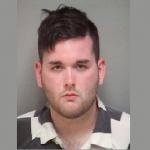Across Virginia

The Virginia Department of Environmental Quality and Mountain Valley Pipeline project teams have agreed to temporarily suspend pipeline installation in Virginia. DEQ Director David Paylor tells us this comes after issues were discovered during inspections, and he says the suspension is temporary:
Paylor says MVP must enhance and restore controls along the route to ensure proper soil erosion and sediment controls are implemented. DEQ will have to approve those changes before construction is allowed to resume.
RICHMOND, Va. (AP) _ Construction of the Mountain Valley Pipeline in Virginia has been halted to address some soil erosion problems. Officials said Friday that the suspension is expected to be temporary for the natural gas pipeline’s installation. Construction will resume with approval from Virginia’s Department of Environmental Quality. DEQ officials said in a statement that the pipeline will direct crews to enhance and restore erosion and sediment controls along the route. Pipeline officials said in a statement that recent heavy rainfall affected crews’ abilities to control erosion. Pipeline officials said they take their “environmental stewardship responsibilities very seriously.” The approximately $3.5 billion, 300-mile pipeline will run through West Virginia and Virginia. It’s scheduled to be in service by the end of the year. A
number of legal challenges against it are pending.
Virginia DEQ News release: Based on issues identified during inspections and complaint inspections by the Virginia Department of Environmental Quality (DEQ), the Mountain Valley Pipeline (MVP) project team has agreed to temporarily suspend pipeline installation in Virginia. To ensure proper soil erosion and sediment controls are implemented, MVP will direct crews to enhance and restore controls along the pipeline route.
All related construction activities within the project’s right of way (a 125-foot wide construction corridor) will resume only after MVP receives approval by DEQ. A list of investigated sites is available on the DEQ website (www.DEQ.Virginia.gov/MVP). DEQ inspectors will continue to be on site to monitor and review pipeline construction throughout the project.
The public is welcome to email complaints to MountainValleyPipeline@DEQ.Virginia.gov or submit pollution reports on the DEQ website at www.DEQ.Virginia.gov/MVP. Public comments, complaints and concerns will be investigated as DEQ receives them.
Mountain Valley Pipeline statement: “Since inception of the Mountain Valley Pipeline (MVP) project, the MVP team has been closely coordinating with the Virginia Department of Environmental Quality (VDEQ) to ensure appropriate soil erosion and sediment controls were implemented, and restored where necessary, along the pipeline route. After direct consultation with VDEQ, and in light of the recent extraordinary rainfall experienced in Virginia, we have agreed to temporarily suspend pipeline installation activities, including welding, trenching, and stringing of pipe, in Virginia. The MVP project team takes its environmental stewardship responsibilities very seriously and wants to redirect its work efforts to focus exclusively on erosion controls affected by recent weather events. As the controls are enhanced and restored at given points along the route, MVP will continue to coordinate with VDEQ to resume full pipeline construction activities in those areas.”

Photo: Appalachians Against Pipelines
BRUSH MOUNTAIN, Va. (AP) – A Virginia Tech professor who locked herself to a piece of construction equipment to protest the Mountain Valley Pipeline has been removed and arrested. The Roanoke Times quotes Virginia State Police Sgt. Rick Garletts as saying Emily Satterwhite will likely be charged with trespassing. The Appalachian studies professor tied herself to a piece of equipment 20 feet above the ground Thursday morning on Brush Mountain in Montgomery County.
Police on cherry pickers cut her free Thursday night. Satterwhite waved to about 30 people gathered near the John Deere excavator as she descended and was met with cheers. Rick Garletts says Satterwhite was jailed after being checked by rescue workers. She had been warned that not voluntarily descending would end in her arrest. She said she would face the consequences.
PREVIOUS: (AP) _ A Virginia Tech professor has climbed atop a piece of construction equipment involved in work on the Mountain Valley Pipeline and locked herself to it. The Roanoke Times reports Emily Satterwhite took up her position on an excavator early Thursday on Brush Mountain in Montgomery County. Satterwhite teaches Appalachian studies and has been active in pipeline protests. State police, sheriff’s deputies and officials with the pipeline and the U.S. Forest Service arrived at the scene. According to the newspaper, they advised Satterwhite she would be arrested if she did not come down voluntarily. She responded that she was willing to face the consequences. Satterwhite’s demonstration is the latest direct action protesters have taken against the multistate natural gas pipeline. Earlier this year, a number of opponents stationed themselves in trees along the route.
 Another summer paving season is now well underway for VDOT — and for the first time, you can see on line exactly which roads are scheduled for work this year. The department is spending more than a half billion dollars this year to repave close to nine thousand lane miles of state-maintained roads. Its new website shows each scheduled project whether planned, in progress or completed. WFIR’s Evan Jones has the story:
Another summer paving season is now well underway for VDOT — and for the first time, you can see on line exactly which roads are scheduled for work this year. The department is spending more than a half billion dollars this year to repave close to nine thousand lane miles of state-maintained roads. Its new website shows each scheduled project whether planned, in progress or completed. WFIR’s Evan Jones has the story:
Click here to see the map.
Click here for information on reporting roadway information to VDOT. Or you can call (800) FOR-ROAD.

UPDATE FROM STATE POLICE: The Virginia Department of Forensic Science in Roanoke has determined that the bone fragment, which was found on private property, on Iron Ridge Road in Franklin County, was not of human origin. Experts determined the bone fragment came from an animal. The Virginia State Police have closed the investigation.
Previous news release: FRANKLIN COUNTY, Va. – Virginia State Police were called to a residence on Iron Ridge Road at 10:50 a.m. on Friday, (Jun 22), to the report of a possible bone fragment which was reportedly found in the path of the Mountain Valley Pipeline.
The trooper arrived at the residence at 11:23 a.m. and was presented a plastic bag containing a bone fragment. Mark Joyner with the Association for the Study of Archaeological Properties, had possession of the bone fragment, which he retrieved from his vehicle. Mr. Joyner stated the bone fragment appeared to be a portion of a vertebrate from a mammal. The owner of the property, on which the bone fragment was found, a Mr. Daniel Angles; reportedly found the fragment sometime between 8 and 8:30 p.m. on Thursday, (Jun 21) while walking on a portion of his land. The land was used to grow agriculture prior to the Mountain Valley Pipeline easement. Mr. Angles had located the fragment that evening, but did not contact law enforcement until the following day.
Mr. Angles and Mr. Joyner lead investigators to the location where the bone was reportedly found. A search of the immediate area did not produce any other remains. It was unclear if the bone fragment was from an animal or human origin. It was determined that since the remains were removed from the location they were found, investigators would determine if the remains were human before they would investigate further.
The remains were transported to the Virginia Department of Forensic Science in Roanoke for evaluation, which may take several days. Once the origin and the age of the fragment are determined, this will dictate how the Virginia State Police will proceed.

James Fields
WASHINGTON (AP) _ Federal hate crime charges have been filed against a man accused of plowing a car into a crowd of people protesting a white nationalist rally in Charlottesville, Virginia, killing a woman and injuring dozens more. The Department of Justice announced that an indictment returned Wednesday charges 21-year-old James Alex Fields of Ohio with 30 crimes, including one count of a hate crime resulting in the death of Heather Heyer, and 28 other hate crimes involving an attempt to kill other people who were injured. Fields already faces state charges of first-degree murder and other crimes. Fields was photographed hours before the attack with a shield bearing the emblem of one of the hate groups taking part in the rally. He has been in custody since then.
From the U.S. Attorney for the Western District of Virginia: Charlottesville, VIRGINIA – A federal grand jury sitting in the U.S. District Court for the Western District of Virginia in Charlottesville today charged an Ohio man with federal hate crimes, including a hate crime act that resulted in the death of Heather Heyer, for his actions during the Aug. 12, 2017 “Unite the Right Rally” in Charlottesville. Attorney General Jeff Sessions, FBI Director Christopher Wray, Acting Assistant Attorney General John Gore of the Civil Rights Division, United States Attorney Thomas T. Cullen of the Western District of Virginia, and Special Agent in Charge of the FBI’s Richmond Division Adam S. Lee, made the announcement.
James Alex Fields Jr., 21, of Maumee, Ohio, was charged in an indictment returned earlier today with:
one count of a hate crime act resulting in the death of Heather Heyer (18 U.S.C. § 249);
28 counts of hate crime acts causing bodily injury and involving an attempt to kill (18 U.S.C. § 249); and
one count of racially motivated violent interference with a federally protected activity (18 U.S.C. § 245(b)(2)), resulting in the death of Heather Heyer, for driving his car into a crowd of protestors on a downtown street in Charlottesville, Virginia.
“At the Department of Justice, we remain resolute that hateful ideologies will not have the last word and that their adherents will not get away with violent crimes against those they target,” Attorney General Jeff Sessions said. “Last summer’s violence in Charlottesville cut short a promising young life and shocked the nation. Today’s indictment should send a clear message to every would-be criminal in America that we aggressively prosecute violent crimes of hate that threaten the core principles of our nation. I want to thank the FBI as well as our fabulous prosecutors Stephen Curran, Christopher Kavanaugh, and Rachel Kincaid for their hard work on this case.”
“As this case indicates, our office will aggressively prosecute hate crimes and other civil-rights offenses committed because of the actual or perceived race, color, religion, or national origin of any individual or group,” U.S. Attorney Thomas T. Cullen stated. “We are grateful to the FBI and our state and local law-enforcement colleagues who conducted the parallel federal and state investigations in a cooperative fashion, enabling us to vindicate this critical federal interest.”
“Hatred and violence have no place in our communities,” said FBI Director Christopher Wray. “The investigation of hate crimes is a top priority of the FBI, and we will continue to work with our partners to ensure those who perpetrate such despicable acts are held accountable.”
“The events of Aug. 12, 2017, in Charlottesville are a grim reminder of why the FBI prioritizes its investigations of civil rights violations among the top of its criminal programs. I hope today will also be a reminder to those who are motivated by hate and intent on committing violence; we are going to be there, just as we were in this case,” said FBI Special Agent in Charge Adam S. Lee of the Richmond Division, who also oversees the office in Charlottesville. “I want to thank the Civil Rights Division and the United States Attorney’s Office for their outstanding partnership, my team of FBI agents and analysts who worked tirelessly to put the case together, and the business owners and residents of Charlottesville who worked with us and provided a massive volume of evidence in this case.”
According to the indictment, on or before Aug. 8, 2017, Fields decided to attend the Unite the Right Rally in Charlottesville, Virginia. The Unite the Right rally was scheduled to occur on Aug. 12, 2017, at Emancipation Park and was widely publicized on social media and internet sites associated with white supremacist individuals and groups.
On the morning of Aug. 12, 2017, Fields arrived in and around the vicinity of Emancipation Park in Charlottesville. Multiple groups and individuals, including Fields, engaged in chants promoting or expressing white supremacist and other racist and anti-Semitic views. After an “unlawful assembly” was declared, rally participants, including Fields, dispersed the area. Fields returned to his vehicle and soon after drove to the vicinity of the intersection of Fourth and East Market streets in downtown Charlottesville.
As alleged in the indictment, Fields drove his car onto Fourth Street, a narrow, downhill, one-way street in downtown Charlottesville. At around the same time, a racially and ethnically diverse crowd of individuals was gathered at the bottom of the hill, at the intersection of Fourth and East Water streets. The indictment alleges that Fields slowly proceeded in his vehicle toward the crowd, stopped, and then observed the crowd while idling in his vehicle. Many of the individuals in the crowd were chanting and carrying signs promoting equality and protesting against racial and other forms of discrimination. With no vehicle behind him, Fields slowly reversed his vehicle to the top of the hill near the intersection of Fourth and Market streets. Fields then rapidly accelerated, ran through a stop sign and across a raised pedestrian mall, and drove directly into the crowd, striking numerous individuals, killing Heather Heyer, and injuring many others. Fields’s vehicle stopped only when it struck another vehicle near the intersection of Fourth and Water streets. He then rapidly reversed his vehicle and fled the scene.
The investigation of the case was conducted by the Federal Bureau of Investigation. United States Attorney Thomas T. Cullen, Assistant United States Attorney Christopher Kavanaugh and Stephen Curran and Rachel Kincaid, trial attorneys with the Civil Rights Division of the Department of Justice, are prosecuting the case for the United States.
An indictment is a formal accusation of criminal conduct, not evidence of guilt. The defendant is presumed innocent unless proven guilty.

WFIR/Evan Jones
State transportation officials say Roanoke Amtrak ridership for the first six months has been impressive — and an obvious boost to the train that heads to Washington and beyond. It helped increase ridership on what had previously been the train to Lynchburg by more than 8% from the same time year before, this at a time when the Amtrak numbers are down a bit both nationwide and in Virginia. WFIR’s Evan Jones has the story:
 The Virginia Association of Broadcasters has again honored WFIR with its award for best radio newscast in the state. This is the third straight year The Roanoke Valley’s Morning news has bested all Virginia radio stations for this highest recognition. The award was presented at the association’s annual summer convention over the weekend in Virginia Beach. We are grateful for your loyalty and confidence in us, and we hope you view this award as reflective of our efforts to meet your expectations.
The Virginia Association of Broadcasters has again honored WFIR with its award for best radio newscast in the state. This is the third straight year The Roanoke Valley’s Morning news has bested all Virginia radio stations for this highest recognition. The award was presented at the association’s annual summer convention over the weekend in Virginia Beach. We are grateful for your loyalty and confidence in us, and we hope you view this award as reflective of our efforts to meet your expectations.
 FREDERICKSBURG, Va. (AP) — The only thing Matthew and Jacob Burgett liked more than playing cops and robbers was a TV show that depicted the same thing.
FREDERICKSBURG, Va. (AP) — The only thing Matthew and Jacob Burgett liked more than playing cops and robbers was a TV show that depicted the same thing.
Seeing real-life officers bust the bad guys on “COPS” was what their dad, Scott, did every day as a state trooper, and the brothers couldn’t wait to join him in uniform.
“I always thought it looked really cool,” said Matthew, 26, who became a Virginia State Policeman three years ago. “The fast cars. The sirens. I always had my mind set on law enforcement.”
Jacob, who’s 23 and recently graduated from the State Police Academy, added: “I’ve never really thought of anything else.”
Clearly.
As the brothers talked, their mother, Cindy Burgett, went to the cabinet of their Fredericksburg home where she keeps construction paper artwork and cards made by her three children. (The couple’s oldest, Sarah, is 28, and followed her mother into the medical field. Cindy is a neonatal intensive care unit nurse, and Sarah is an X-ray nurse.)
Cindy retrieved a Father’s Day card, undated, that Jacob had done, probably in elementary school. The cover showed his father’s uniform from the neck to the black attachments on his belt. There was a dark blue tie, his dad’s badge and name tag.
Inside, Jacob had scrawled the lines from the theme song of his favorite show: “Bad boys, bad boys. Whatcha gonna do? Whatcha gonna do when they come for you?”
Then, he signed the card on the last page. Next to the drawing of a police car with two antennas, he wrote “Happy Father’s Day!” in oversize letters and included a postscript that really spoke to where his head — and heart — were.
It read: “PS: you rock dude!”
Their father may have wanted to say the same to his boys when they graduated from Basic Trooper Session. Participants can have a relative or friend, also in law enforcement, hand them their diplomas, or they can get them from the Virginia State Police superintendent.
The person Matthew and Jacob Burgett chose was 1st Sgt. Scott Burgett, who beamed with pride.
“This is fantastic,” he said at Jacob’s graduation.
Like the ceremony, the training classes — all 1,340 hours spread out over 29 weeks and 98 courses — are held at state police headquarters in North Chesterfield near Richmond.
Each member of the Burgett family attended Jacob’s graduation. Matthew is three years older, but when he and his brother stood next to each other in uniform, with the same buzz cut and “cover” on their heads, they looked like twins.
All the Burgetts have blue eyes, but the boys’ are the color of a glacier, like their mother’s.
It’s not unusual to have fathers and sons, dads and daughters and husbands and wives on the force, said Virginia State Police Capt. Todd Taylor. Matt is under his command, and Taylor often jokingly tells Scott — who he’s known more than 25 years — that he’s the second-best trooper in the family. He teases that he’ll have to change it to third best now that Jacob has joined.
Then, on a serious note, he said the Burgetts are “thinking men” who reason their way through problems.
“I’m just proud of them all,” he said. “They’re good folks, a good family. I would like to have a whole bunch more of them.”
Scott and Cindy Burgett are both 54, and to them, it doesn’t seem that long ago when he started his police career. He graduated from the academy 29 years ago after earning a criminal justice degree from Virginia Commonwealth University.
Their sons followed the same path. The only difference was, Scott was a few years older when he joined the force and already was a dad.
And, Scott didn’t have anyone to inspire him to do police work. His father was in the Air Force.
“Honestly, it sounds so hokey, but I wanted to do something I felt was worthwhile, relevant, something important,” the elder Burgett said. “I wanted to help people.”
He figured he’d eventually go into federal work, but he loved the state police so much, he made it his career.
He’s worked as a road trooper and special agent, done background work and assisted in investigations. He’s looked into general crimes, arson and bombs, been assigned to Smithfield, Richmond and Fairfax and now works in drug investigation out of the Culpeper office.
Matthew, who is assigned to Orange County, already has tapped into his father’s experience. The two talk over a crash-scene investigation, as the younger asks the older his take of things. “I’ll say, ‘This is what I’m thinking, what does this sound like to you?’ ” Matthew said.
Two days after Jacob graduated and started work in Caroline County, police officers nationwide held their 30th annual candlelight vigil at the National Mall to honor those killed in the line of duty. Matthew was there, part of the Virginia State Police Honor Guard, as three new names from the state force were etched in stone.
Col. Gary Settle, superintendent of the state police, probably didn’t need to remind those at Jacob’s graduation that the new troopers — like the multitude of other uniformed officers in the audience — face peril on the streets.
“What consumes my thoughts daily and keeps me up at night is your safety,” Settle said to the graduates. “We’ve been reminded too many times in recent years of the dangers that exist for public safety officials.”
Settle shared the story from the movie, “American Sniper,” about the three types of people in the world: wolves, sheep and sheepdogs. The latter are warriors, Settle said, working to fend off the wolves and protect the sheep.
He said it’s the trooper’s job to identify the bad guys and protect the good ones. But when policemen are swayed by the way people look, dress or talk or their backgrounds or skin color, “then we become the wolves and have failed our mission as a Virginia State Police trooper.”
Scott and Cindy Burgett think about the current tensions, too, and what the situation will be like for their sons.
She says the whole family is calm and level-headed to the point of being downright boring. She’s confident her husband and two sons won’t have any difficulty exercising their considerable discipline and self-control.
He says the same, even though the climate is probably the worst the tenured trooper has ever seen.
“As a father, I’m proud of them for being brave enough to do it,” he said. “But I also expect them to follow their training, do what they know is right and stay safe.”
___
 RICHMOND, Va. (AP) — More than 30 years have passed since Larry “Sleepy” Belcher returned from a Chesterfield County Planning Commission meeting to deliver the news to his friends: The county wanted to build a freeway in this part of southern Chesterfield, and it would likely take their house on Happy Hill Road.
RICHMOND, Va. (AP) — More than 30 years have passed since Larry “Sleepy” Belcher returned from a Chesterfield County Planning Commission meeting to deliver the news to his friends: The county wanted to build a freeway in this part of southern Chesterfield, and it would likely take their house on Happy Hill Road.
But they shouldn’t worry, Johnnie Humphrey remembers Belcher telling her and her husband, Earl.
“‘The county won’t have enough money for it while we are still alive,’” Humphrey recalled Belcher, a planning commissioner at the time, saying.
His prediction wasn’t entirely correct.
“Earl is dead and gone. Sleepy is gone,” Humphrey said. “But me and his wife are still here.”
And a 2½-mile leg of that freeway the county sees as key for future development appears poised to pass through the living room of the house Humphrey and her husband built in 1967. In addition, a nearby elementary school in the path of the preferred freeway route is getting closer to being demolished and rebuilt at a nearby county park.
Humphrey thought that prospects for the freeway had grown dimmer and that the nearly 6 acres she inherited from her father were safe.
Developers of a nearly 5,000-home subdivision that supervisors approved had agreed to build the freeway along with the homes, but the project never materialized. After that, Humphrey added a family room to the back of her house.
Then, this past year, Humphrey, along with hundreds of other residents, successfully fought the county Economic Development Authority’s proposal to purchase and rezone that same nearly 1,700-acre area to make way for an industrial megasite.
Authority officials had said the first part of that freeway would provide critical access to Interstate 95 for whichever business located there.
Now, the question Humphrey is asking is not if the freeway will come, but when.
School leaders also are making preparations. They’re moving forward on plans to rebuild a 750-student Harrowgate Elementary School on nearby parkland rather than renovate it on the school site that now sits in the path of the preferred route of the freeway. This past week, the School Board decided to request county supervisors’ approval to rebuild the school on the park site.
In addition, in a March briefing to county supervisors, Transportation Director Jesse Smith said an environmental assessment of the project is underway.
By October, the county hopes the federal government will have found the plan has no significant environmental impact. The next month, staff members would ask the elected Board of Supervisors for the money and permission to move forward with acquiring right-of-way, excluding eminent domain.
Smith said the route that goes through the current elementary school site and Humphrey’s home is the least disruptive of six options they considered since it would require three homeowners to relocate. The most disruptive to residents would have displaced 77. It’s also the least expensive.
In January, the county plans to begin working with willing landowners to acquire property rights.
Humphrey isn’t one of those willing landowners.
“I don’t want them to come through my property. I’m not going to make it easy,” she said, saying she received a phone call about relocation services just after Thanksgiving that she has yet to return. “I’m 75 years old. I planned to die here. But the powers that be are not going to let that happen.”
If the school is rebuilt at Harrowgate Park, the community would lose about 25 acres of parkland, and there currently isn’t land in place to replace those 25 acres. The county does intend to renovate or replace athletic fields at Carver Middle School, adjacent to the park.
“We are putting plans in place to improve the athletic fields. The missing ingredient is finding the replacement acreage. We are going to replace whatever is lost at Harrowgate Park as soon as we possibly can. We do need to find a seller and negotiate a purchase. We don’t have a specific target date,” said Stuart Connock with the Parks and Recreation Department.
Board of Supervisors Chair Dorothy Jaeckle didn’t immediately respond to questions about the proposed freeway’s potential impact Friday afternoon.
Some school leaders have maintained the decision to replace rather than renovate Harrowgate was not contingent on the megasite proposal succeeding. A rebuilt school will have a longer lifespan than a renovated one, they have argued.
In addition, the new school would sit adjacent to Carver Middle. And the park site was the best option out of several considered while a relocation received widespread community support, board members have said.
Others said officials didn’t give the community enough input in the school and park’s fate, which residents have said at community meetings is typical of Chesterfield’s treatment of the southeastern portion of the county.
“Bermuda District has most of the industry in the county. But money is being spent in the northern end of the county. Look at Jeff Davis,” Humphrey said, referring to the Jefferson Davis Highway corridor. “Taxpayers in this part of the county suffer through the smells of the landfill and all the industry.”
Supervisor Steve Elswick said that it’s important for the county to have a plan for how to replace the lost parkland.
“As we move forward with the school, if it goes over where the park is now, it’s important to have a plan on how we are going to manage it,” Elswick said.
Just when an actual road might be put on the ground remains uncertain.
“The county will need that highway one day, and it’s just a matter of when,” Elswick said.
“When?” has been on Humphrey’s mind over decades spent watching chicken farms disappear as families sold off their land to make way for subdivisions. The one neighbor she can think of who still has farmland is too old to work it anymore.
She often receives notices in her mailbox from developers asking her to call if she is interested in selling her 5.7 acres.
“It shows how little research they have done. If they had done any research at all, they would know I’m not willing to sell,” she said.
___
 VIRGINIA BEACH, Va. (AP) — A Virginia man has been found guilty of attacking his ex-girlfriend outside of her home and injecting her with a fatal dose of cyanide.
VIRGINIA BEACH, Va. (AP) — A Virginia man has been found guilty of attacking his ex-girlfriend outside of her home and injecting her with a fatal dose of cyanide.
The Virginian-Pilot reports 30-year-old Joseph Merlino III was convicted Friday of first-degree murder for the death of 35-year-old Ellie Tran. She died after being attacked and injected with the poison on Valentine’s Day 2017.
Merlino denied in court Friday that he researched lethal doses of cyanide and ordered a $68 stainless steel syringe online. He said other people had access to the computer used to conduct the searches.
He also denied writing coded letters meant to get his mother and new girlfriend to fabricate evidence for him. He said they were coded because prison staff previously had stolen his mail or failed to send it.
___







